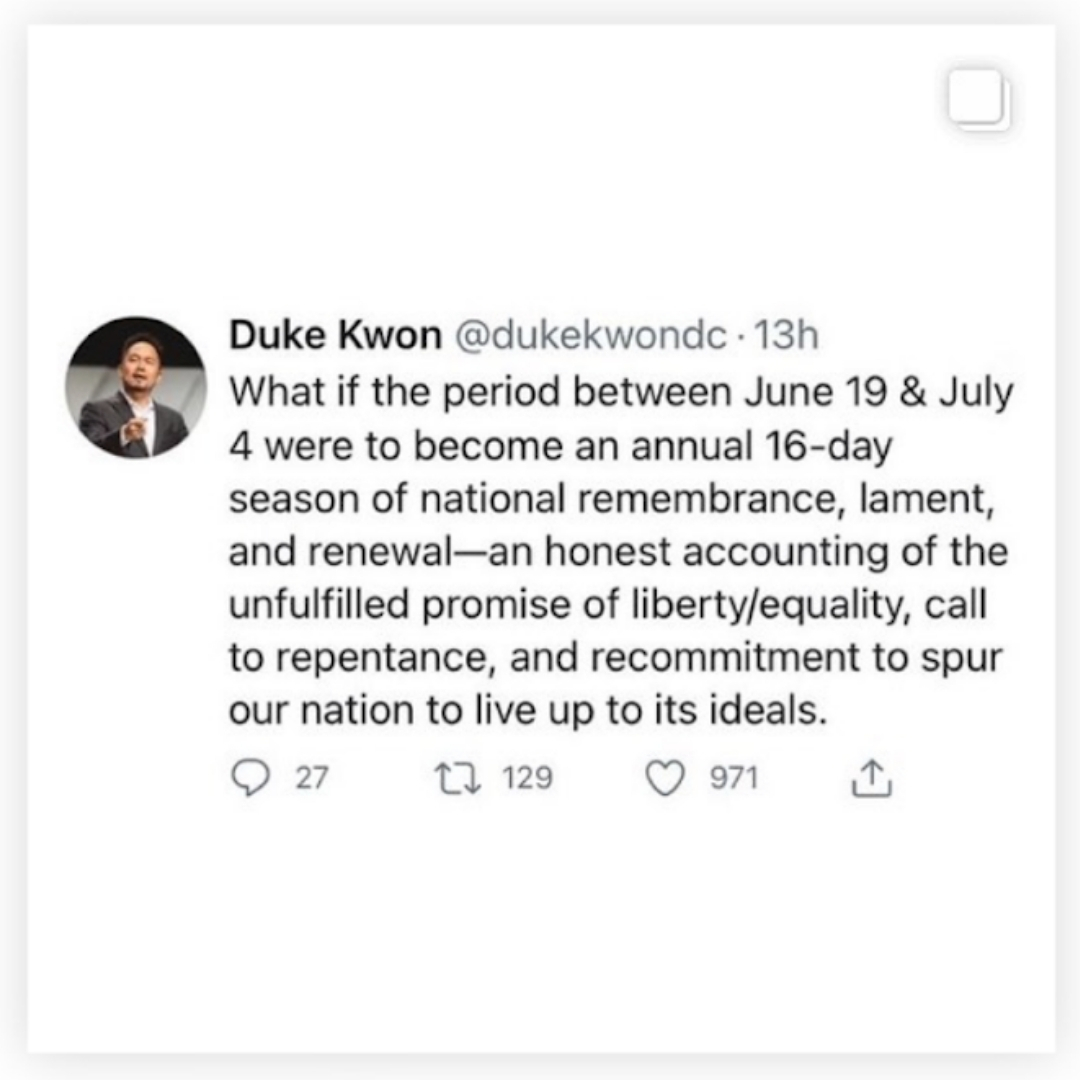I saw this post on Instagram and it stopped me in my tracks.

"What if the period between June 19 & July 4 were to become an annual 16-day season of national remembrance, lament, and renewal--an honest accounting of the unfulfilled promise of liberty/equality, call to repentance, and recommitment to spur our nation to live up to its ideals." ~Duke Kwon, @dukekwondc on Twitter
I thought the idea was great but the thought that the government might accept it was laughable. But the church doing it? Well, why not the church? I know many are disgruntled and frustrated with the [American] church. With 2020 being the year of exposure; abuse, fraud, false doctrine, hatred, and a plethora of other things happening within the church made headlines. I haven’t given up on the church, mostly because we’re the Bride and Christ hasn’t and will not give up on us.
But as I began to ponder why not, the [American] church? I thought of a few things we’d need to move past to get to a place of ‘honest accounting...repentance...and recommitment’.
-
Honest Assessment
One of my mentors says “All change begins with honest self-assessment.” You heard me mention, God can’t heal what you conceal. In some spaces (I don’t think it’s a stretch to say mostly homogeneous spaces), race isn’t talked about. Sometimes it’s considered divisive to bring it up. For others it’s a thing of the past and has no bearing on where and who we are today. And in many churches in America, we’re still debating whether or not slavery is still having an impact on our today. We’ve over politicized CRT without having an understanding of what it is. We’ve spewed opinions before listening. We’re using different definitions to describe the same things.
Here are some facts we should reckon with:
-
32% of the US population is represented by African Americans and Hispanics, compared to 56% of the US incarcerated population being represented by African Americans and Hispanics. (Source: NAACP)
-
African Americans are incarcerated at more than 5 times the rate of whites.
-
While their rate of imprisonment has decreased the most in recent years, black Americans remain far more likely than their Hispanic and white counterparts to be in prison. The black imprisonment rate at the end of 2018 was nearly twice the rate among Hispanics (797 per 100,000) and more than five times the rate among whites (268 per 100,000). (Source: Pew research)
-
Native students perform two to three grade levels below their white peers in reading and mathematics. They are 237 percent more likely to drop out of school and 207 percent more likely to be expelled than white students. (Source: NCSL)
-
In 2016, the typical White family has eight times the wealth of the typical Black family and five times the wealth of the typical Hispanic family. (Source: Federal Reserve)
-
Black, American Indian, and Alaska Native (AI/AN) women are two to three times more likely to die from pregnancy-related causes than white women…” (Source: CDC)
-
The NYPD reported that hate crimes motivated by anti-Asian sentiment jumped 1,900% in New York City in 2020.” (Source: Time Magazine via Queens Chronicles)
If you google race disparity, and pick a topic at random, you’ll find a disparity in just about every field of study. There’s a disconnect with where we are and where we’ve been and so true repentance for the sin of racism hasn’t happened collectively and some feel it isn’t needed. Before we can pass go, we’ve got to take an honest assessment of the way race impacts our society TODAY.
-
Individualism is rampant in the American church
I think part of the disconnect/challenge to this is the way American culture has crept into the church. More specifically, the way American Individualism has crept into the church. Perhaps, it’s always been there.
It may be strong to say, but individualism is anti-gospel, and has little Biblical precedence. Connectedness and community was understood in Israel’s culture. So, victory, defeat and repentance was felt as a community. You can see communal responsibility in Joshua 7. The Israelites were losing a battle with the Amorites. Joshua cries out to the Lord and God reveals that it’s because of sin in the camp. They go tribe by tribe, family by family to discover Achan is the culprit. The notes of Joshua 7:24 in the Zondervan Cultural Backgrounds Study Bible explains what is likely a phenom to most Americans:
“In the ancient Near East, a person found identity within a group. Integration and interdependence were important values. Consequently, individual behavior would not be viewed independently from the group. When one family member sinned, the whole family shared the responsibility. This is true on the national level as well; Achan, as a member of the group of Israel, infects the entire nation with his sin.”
I want to emphasize this “Achan, as a member of the group of Israel, infects the entire nation with his sin.” You the know the scripture ‘a little leaven leavens the whole lump…” (Gal 5:9).
The thread was hope-- in a Savior that would come to us in our mess, rightly judge, call us out and restore us to the Father and one another.
There’s room for personal responsibility but not at the expense of understanding how we affect and are affected by the community. It’s a both and- both personal and communal responsibility are important to God and should be to us. These things that are values in ancient Biblical culture are a little more foreign to us.
So I think we’re primed to have a 16-day season of remembrance, repentance, and renewal. Understand that my critique comes from love and from seeing what we could be.
We’re never to give up hope. When I read the prophets, though I see judgement, I can also see a gold thread woven throughout that came alive in the person of Jesus and continued throughout the Bible. The thread was hope-- in a Savior that would come to us in our mess, rightly judge, call us out and restore us to the Father and one another. I see it in the early church in Acts when they had all things in common. I also see the working out of their coming together in the grievances and disagreements found in Corinthians and the rest of the Epistles. There's a blueprint, there’s a model.
I see glimmers in the current church - the burst of small groups, house churches that do life together, and even the friends that remain in community though disconnected from a physical church. People that listen to each other’s stories, and bear each other's burdens. We ARE the body of Christ. We CAN operate together. We can listen, learn, lament, remember, repent and renew our faith together IN Christ. They hoped for a savior to come, and so do we-- And in waiting, we hope and put in the work BECAUSE we know he’s coming again.
Photo by Daniel Curran on Unsplash





The Reformed family is a diverse family with a diverse range of opinions. Not all perspectives expressed on the blog represent the official positions of the Christian Reformed Church. Learn more about this blog, Reformed doctrines, and our diversity policy on our About page.
In order to steward ministry shares well, commenting isn’t available on Do Justice itself because we engage with comments and dialogue in other spaces. To comment on this post, please visit the Christian Reformed Centre for Public Dialogue’s Facebook page (for Canada-specific articles) or the Office of Social Justice’s Facebook page. Alternatively, please email us. We want to hear from you!
Read more about our comment policy.